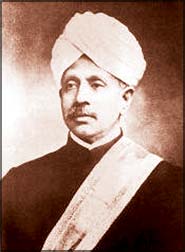Ponnambalam Arunachalam facts for kids
Quick facts for kids
Sir Ponnambalam Arunachalam
MLC CCS
|
|
|---|---|
|
பொன்னம்பலம் அருணாசலம்
|
|
 |
|
| Member of the Executive Council of Ceylon | |
| In office 1912–1913 |
|
| Member of the Legislative Council of Ceylon | |
| In office 1912–1913 |
|
| President of the Ceylon National Congress | |
| In office 1919–1920 |
|
| Personal details | |
| Born |
P. Arunachalam
14 September 1853 Colombo, Ceylon |
| Died | 9 January 1924 (aged 70) Madurai, India |
| Alma mater | Christ's College, Cambridge |
| Occupation | Civil servant |
| Ethnicity | Ceylon Tamil |
Ponnambalam Arunachalam (Tamil: பொன்னம்பலம் அருணாசலம்; September 14, 1853 – January 9, 1924) was an important person from Ceylon (now Sri Lanka). He was a civil servant, meaning he worked for the government. He was also a member of the Executive Council of Ceylon and the Legislative Council of Ceylon, which were like important government committees.
Contents
Early Life and Education
Ponnambalam Arunachalam was born on September 14, 1853, in Colombo, which was then part of British Ceylon. He came from a Tamil family. His father, A. Ponnambalam, was a leading government official. Ponnambalam Arunachalam had two brothers, P. Coomaraswamy and P. Ramanathan.
School and University
Arunachalam went to Royal Academy, Colombo (now Royal College). He was a very bright student and won many awards there. After school, he earned a scholarship to study at Christ's College, Cambridge in England in 1871.
He graduated in 1874 with a Bachelor of Arts (BA) degree in law and history. He later received a Master of Arts (MA) degree from Cambridge in 1880.
Family Life
In 1883, Arunachalam married Svarnambal. They had three sons: Padmanabha, Mahadeva, and Ramanathan. They also had five daughters: Maheswari, Manonmani, Sivanandam, Pathmavathy, and Sunthari.
A Career in Public Service
Arunachalam became a lawyer in 1875. He wanted to practice law, but his uncle convinced him to join the civil service instead. The civil service is a system where people work for the government in non-military jobs.
First Ceylonese Civil Servant
In 1875, Arunachalam took the Civil Service Examinations. He became the first Ceylonese person to join the Ceylon Civil Service through an open competition. This was a big achievement!
He started his career in the Government Agent's office in Colombo. After that, he held many different government jobs. He worked as a police court magistrate in Kandy and as a police magistrate and commissioner in several towns like Kalpitiya, Puttalam, and Matara. He also served as a district judge in places like Chilaw and Batticaloa.
Important Government Roles
Arunachalam's excellent work was noticed early in his career. In 1887, Governor Arthur Hamilton-Gordon appointed him as acting Registrar-General. This was a very important role.
The department he took over had many problems like fraud and inefficiency. Arunachalam successfully reorganized it and made it work much better. He was later appointed Registrar-General in 1898.
In 1900, he was put in charge of managing the 1901 census, which counts all the people in a country. He also started to organize and write down all of Ceylon's laws.
Legislative Council and Retirement
Between 1912 and 1913, Arunachalam was an official member of the Legislative Council of Ceylon and the Executive Council of Ceylon. These councils helped govern the country.
He retired from the civil service in 1913. In February 1914, he was given the title of "Sir" (knighted) for his great service.
Political and Social Contributions
Even while working in the civil service, Arunachalam was interested in political reform. After retiring, he became very active in politics.
Founding Political Groups
In 1917, he helped start the Ceylon National Association and the Ceylon Reform League. He was the chairman of the Reform League.
He was also one of the founders of the Ceylon National Congress (CNC) in 1919. He served as its first president from 1919 to 1920.
Arunachalam later left the CNC in 1921. This happened because of disagreements about how different communities should be represented in the Legislative Council. He believed in fair representation for all. In 1923, he founded the Ceylon Tamil League.
Other Important Work
Arunachalam was involved in many other important organizations:
- In 1917, he became the first Ceylonese person to be elected president of the Ceylon Branch of the Royal Asiatic Society.
- He founded the Senthamil Paripalana Sabai and was president of the Ceylon Saiva Paripalana Sabai, which were religious organizations.
- He and his wife also founded the Sri Arunachaleswarar Temple in Mutwal.
- In 1915, he helped start the Ceylon Social Services League and served as its president.
- He was also involved in helping workers. In 1919, he founded Ceylon's first trade union, the Ceylon Workers' Welfare League. He was president of the Ceylon Workers' Federation from 1920 to 1921.
"Father of the Ceylon University"
Arunachalam strongly campaigned for a university to be built in Ceylon. He founded the Ceylon University Association in 1906. Because of his efforts, he is known as the "father of the Ceylon University."
Ponnambalam Arunachalam passed away on January 9, 1924, in Madurai, India. He was on a Hindu pilgrimage at the time.
Writings and Publications
Ponnambalam Arunachalam also wrote several books and articles:
- A Revel in Bliss (1895)
- A Few Hymns of Manikka Vachaka and Thayumanavar (1897)
- Sketches of Ceylon History (1906, Ceylon National Review)
- A Digest of the Civil Law of Ceylon
- Studies and Translations from the Tamil
- Studies and Translations – Philosophical and Religious (1937)
 | Aaron Henry |
 | T. R. M. Howard |
 | Jesse Jackson |

